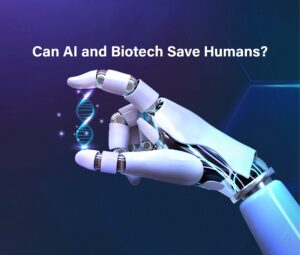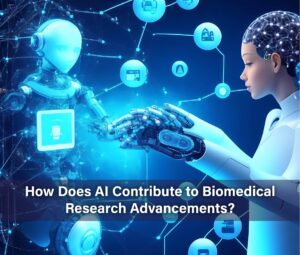AI has become an increasingly valuable tool in the field of biotechnology. Across various sectors like pharmaceuticals, healthcare, animal husbandry, agriculture, and AI and machine learning (ML) technologies are reshaping processes to achieve more precise and efficient outcomes. The integration of AI in biotechnology holds immense potential for driving advancements and fostering innovation.
While pharmaceutical companies dominate this industry, other players are rapidly gaining ground. According to statistics, the pharmaceutical industry is projected to invest approximately $3 billion in utilizing AI for drug discovery by 2025. Additionally, 82% of industry experts believe that digitalization will continue to be integrated into operations even though the Covid-19 pandemic has subsided.
The biotech industry can experience a significant transformation with the power of big data and data analytics. Artificial intelligence (AI) plays a vital role in this revolution, employing various technologies such as machine learning algorithms, natural language processing (NLP), neural networks, and advanced robotics. This integration of AI in biotechnology has led to innovative solutions that enhance the quality of life for individuals worldwide.
New biotech companies are emerging on the global market, embracing AI as an essential component of their business models. In fact, reports indicate that by December 2022, venture funding for the biotech industry reached an impressive $2.4 billion. These companies heavily rely on AI biotech solution providers to integrate advanced technology systems across all verticals.
This blog examines the significance of AI in biotechnology and how it is being applied to drive innovation and prepare biotech companies for future developments.
Can AI and Biotech Save Humans?
 Indeed, both artificial intelligence and biotech have the potential to save lives. They can assist researchers in developing high-quality drugs that have fewer or no side effects. Moreover, they can aid in accurately diagnosing intricate illnesses within the healthcare sector and identifying and modifying gene patterns to prevent life-altering diseases.
Indeed, both artificial intelligence and biotech have the potential to save lives. They can assist researchers in developing high-quality drugs that have fewer or no side effects. Moreover, they can aid in accurately diagnosing intricate illnesses within the healthcare sector and identifying and modifying gene patterns to prevent life-altering diseases.
Most importantly, integrating AI with biotechnology enables various industrial actors to communicate and collaborate without regard to distance. They can uncover answers to save lives and develop pharma (medical) technologies based on AI.
Can AI in Biotechnology Become a Reality?
The biotech industry is making significant advancements by leveraging big data, AI, and ML technologies. According to experts and high-ranking executives in leading biotech and pharmaceutical companies, the year 2023 will mark a revolution in AI’s application within the field of biotechnology. The combination of machine learning in biotech with genomics and AI will bring substantial value and prove to be a fit for various applications.
AI’s contribution to biotechnology goes beyond automating tedious operations and organizing data flow. It can aid in research, day-to-day work, data analytics, drug manufacturing, and much more. It speeds up the entire process by assisting human researchers to process large datasets accurately in a short time.
How Does AI Contribute to Biomedical Research Advancements?
 AI-driven biomedical research has made significant contributions to the advancement of biomedical research. Here are some of the key areas AI has transformed:
AI-driven biomedical research has made significant contributions to the advancement of biomedical research. Here are some of the key areas AI has transformed:
-
Drug Discovery and Development:
AI is revolutionizing the drug discovery process by improving efficiency and speed. Using advanced algorithms, it can analyze extensive amounts of data, such as genetic information, molecular structures, and clinical trial results. By doing so, AI can identify potential drug candidates and predict their effectiveness and safety. This breakthrough technology greatly reduces the time and expenses required to bring new drugs to market.
-
Precision Medicine:
AI plays a crucial role in personalized medicine by analyzing massive patient data, including lifestyle factors, medical records, and genetic information. This analysis allows the customization of treatments based on individual patients, as well as predicting disease outcomes and determining the most effective treatment strategies.
-
Medical Imaging and Diagnostics:
AI algorithms have the ability to analyze various medical images, including X-rays, MRIs, and CT scans, in order to aid in disease detection and diagnosis. By utilizing AI-powered image analysis, the patterns, anomalies, and early indicators of diseases can be identified more efficiently and accurately. As a result, diagnoses can be made promptly with higher precision.
-
Genomics and Genetic Research:
By analyzing genomic data, AI algorithms can uncover genetic variations linked to diseases and provide insights into disease risk. This valuable information aids in comprehending the genetic foundations of illnesses, advancing targeted therapies, and identifying promising drug targets.
-
Data Analysis and Pattern Recognition:
AI has the ability to analyze vast amounts of biomedical data, such as electronic health records, clinical trial information, and research publications. By doing so, it can uncover hidden patterns, correlations, and insights that may not be immediately evident to human researchers. This powerful capability accelerates scientific discoveries and aids in making informed decisions based on evidence.
-
Drug repurposing:
It is another area where AI algorithms have shown promise. By analyzing existing drugs and their known effects, these algorithms can identify potential new uses for approved drugs. This approach not only expedites the development of treatments for new indications but also helps reduce costs.
-
Clinical Decision Support:
AI-powered clinical decision support systems can be valuable tools for healthcare professionals. By integrating patient data, medical knowledge, and research evidence, these systems can help improve the accuracy of diagnoses and treatment selection, as well as predict patient outcomes. They provide personalized recommendations that ultimately contribute to better patient care.
-
Biomedical research:
This field can greatly benefit from AI automation. Tasks that are repetitive and time-consuming, such as data analysis, literature review, and experiment design, can be efficiently performed by AI systems. By automating these tasks, researchers are able to allocate more time and energy toward the complex and creative aspects of their work. This ultimately expedites scientific discovery.
It is crucial to acknowledge that although AI has demonstrated significant potential in biomedical research, it is still an evolving field. Hence, further research and validation are necessary to fully unlock its capabilities.
In a Nutshell
The field of AI in biotechnology is advancing at a notable pace, offering new possibilities across industries such as pharmaceuticals, agriculture, and industrial sectors. Biotech companies need to take a proactive approach and embrace AI technologies to enhance their efficiency. To quickly and effectively undergo digital transformation, many biotech firms are forming partnerships with AI service providers. By automating repetitive tasks and accelerating the discovery process, AI holds immense potential to revolutionize the field of biotech.


